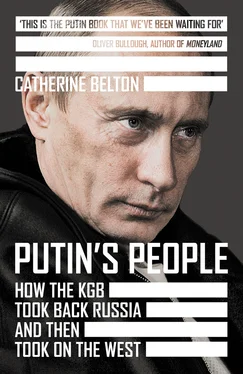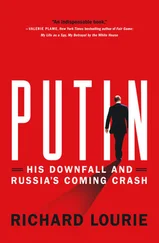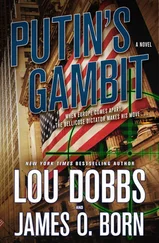Since the early eighties, a few progressive members of the KGB had been working on a transformation of sorts. Ensconced in the Institute for World Economy in Moscow, they began working on reforms that could introduce some elements of the market to the Soviet economy in order to create competition, yet retain overall control. When Mikhail Gorbachev took office as General Secretary of the Communist Party in 1985, these ideas were given impetus. Gorbachev launched the political and economic reforms of glasnost and perestroika , which aimed for a gradual loosening of control over the country’s political and economic system. Throughout the eastern bloc, the mood of protest was rising against the repression of Communist rulers, and Gorbachev pressed his colleagues across the Warsaw Pact to pursue similar reforms as the only way to survive and stay ahead of the tide of resentment and dissent. Aware that a collapse could nevertheless be on its way, a small handful of KGB progressives began preparing for a fall.
As if seeing the writing on the wall, in 1986 Markus Wolf, the Stasi’s venerated Spymaster, resigned, ending his reign over East Germany’s feared foreign-intelligence unit, the Hauptverwaltung Aufklärung, where for more than thirty years he’d ruthlessly run operations for the Stasi, known for his ability to relentlessly exploit human weaknesses to blackmail and extort agents into working for him. Under his watch the HVA had penetrated deep into the West German government, and had turned numerous agents thought to be working for the CIA. But now he’d somehow suddenly dropped all that.
Officially, he was helping his brother Konrad write his memoirs of their childhood in Moscow. But behind the scenes he too was preparing for change. He began working closely with the progressive perestroika faction in the KGB, holding secret meetings in his palatial Berlin flat to discuss a gradual liberalisation of the political system.[30] The plans they spoke of were similar to the glasnost reforms Gorbachev had launched in Moscow, where informal political movements were gradually being allowed to emerge and media constraints were being relaxed. But though the talk was of democracy and reform, the plan was always for the security services to remain in control behind the scenes. Later it turned out that Wolf had secretly remained on the Stasi payroll throughout.[31]
Ever more aware of the risks of Communist collapse, in the mid-eighties the KGB quietly launched Operation Luch, to prepare for a potential regime change ahead. Wolf was kept fully aware of it, but his successor as head of the Stasi foreign-intelligence arm was not.[32] In August 1988 the KGB sent a top official, Boris Laptev, to the imposing Soviet embassy in East Berlin to oversee it.[33] Officially, Laptev’s mission was to create a group of operatives who would work secretly in parallel with the official KGB residency to penetrate East German opposition groups. ‘We had to collect information on the opposition movement and put the brakes on any developments, and prevent any moves towards German reunification,’ he later said.[34] But in fact, as the anti-Communist protests grew and the futility of such efforts became ever clearer, his mission became almost the opposite of that. The group instead began to focus on creating a new agent network that would reach deep into the second and third tier of political circles in the GDR. They were looking for agents who could continue to work undercover for the Soviets even in a reunified Germany, untainted by any leadership role before the collapse.[35]
The signs are that Putin was enlisted to play a part in this process. In those days he served as Party secretary,[36] a position that would have put him in frequent contact with Dresden’s SED chief Hans Modrow. The KGB appear to have hoped that they could cultivate Modrow as a potential successor to the long-serving East German leader Erich Honecker, apparently even believing he could lead the country through modest perestroika -like reforms.[37] Vladimir Kryuchkov, the KGB foreign-intelligence chief, paid a special visit to Modrow in Dresden in 1986.[38]
But Honecker had refused to step down until the bitter end, forcing the KGB to dig deeper to recruit agents who would continue to act for them after the fall of the eastern bloc. Kryuchkov would always insist that he never met Putin then, and to deny that Putin played any part in Operation Luch, as did Markus Wolf.[39] But the West German equivalent of MI5, the Bundesamt für Verfassungsschutz, believed the reverse. They later questioned Horst Jehmlich for hours on what Putin had been up to then. Jehmlich suspected that Putin had betrayed him: ‘They tried to recruit people from the second and third tier of our organisation. They went into all organs of power, but they didn’t contact any of the leaders or the generals. They did it all behind our backs.’[40]
Other parts of the Stasi also began secretly preparing. In 1986, Stasi chief Erich Mielke signed off on plans for a squad of elite officers, the Offiziere im besonderen Einsatz, to remain in power in case the rule of the SED suddenly came to an end.[41] The most important phase of securing the Stasi’s future began when they started moving cash via their smuggling networks through a web of firms into the West, in order to create secret cash stores to enable them to maintain operations after the fall. A senior German official estimated that billions of West German marks were siphoned out of East Germany into a string of front companies from 1986.[42]
Putin’s Dresden was a central hub for these preparations. Herbert Kohler, the head of the Dresden HVA, was closely involved in the creation of some of these front companies – so-called ‘operative firms’ – that were to hide their connections with the Stasi and store ‘black cash’ to allow Stasi networks to survive following a collapse.[43] Kohler worked closely with an Austrian businessman named Martin Schlaff, who’d been recruited in the early eighties by the Stasi. Schlaff was tasked with smuggling embargoed components for the construction of a hard-disc factory in Thüringen, near Dresden. Between the end of 1986 and the end of 1988 his firms received more than 130 million marks from the East German government for the top-secret project, which was one of the most expensive ever run by the Stasi. But the plant was never finished. Many of the components never arrived,[44] while hundreds of millions of marks intended for the plant, and from other illicit deals, disappeared into Schlaff front companies in Liechtenstein, Switzerland and Singapore.[45]
These financial transfers took place at the time Putin was serving as the main liaison officer between the KGB and the Stasi in Dresden, in particular with Kohler’s HVA.[46] It’s not clear whether he played any role in them. But many years later, Schlaff’s connections with Putin became clear when the Austrian businessman re-emerged in a network of companies in Europe that were central cogs in the influence operations of the Putin regime.[47] Back in the 1980s Schlaff had travelled at least once to Moscow for talks with Soviet foreign-trade officials.[48]
Most of what Putin did during the Dresden years remains shrouded in mystery, in part because the KGB proved much more effective than the Stasi at destroying and transferring documents before the collapse. ‘With the Russians, we have problems,’ said Sven Scharl, a researcher at the Stasi archives in Dresden.[49] ‘They destroyed almost everything.’ Only fragments remain in the files retrieved from the Stasi of Putin’s activities there. His file is thin, and well-thumbed. There is the order of Stasi chief Erich Mielke of February 8 1988, listing Major Vladimir Vladimirovich Putin as receiving a Bronze Medal of Merit of the National People’s Army. There are the letters from the Dresden Stasi chief Horst Böhm wishing Comrade Putin a happy birthday. There is the seating plan for a dinner celebrating the seventy-first anniversary of the Cheka, the original name for the Soviet secret police, on January 24 1989. There’s the photograph marking the visit of more than forty Stasi, KGB and military officers to the First Guards Tank Army Museum. (Putin peeps out, almost indistinguishable among the grey mass of men.) Then there are the photographs, uncovered only recently, of a loutish and bored-looking Putin in light-grey jacket and bright suede shoes holding flowers and drinking at an award ceremony for the Stasi intelligence unit’s top brass.
Читать дальше












